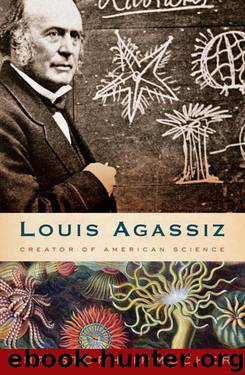Louis Agassiz: Creator of American Science by Christoph Irmscher

Author:Christoph Irmscher [Irmscher, Christoph]
Language: eng
Format: epub
ISBN: 9780547577678
Amazon: 0547577672
Publisher: Houghton Mifflin Harcourt
Published: 2013-02-05T05:00:00+00:00
John Bachman, by John Woodhouse Audubon. Oil on canvas, c. 1837.
Bachman’s mounting irritation with polygenists like Samuel Morton and Louis Agassiz would soon find its outlet in a book-length refutation of their theories and a powerful defense of human “monospecism,” based, in part, on Bachman’s own excellent knowledge of ornithology and his numerous experiments with hybridized roses conducted in his own garden. Yet Bachman and Agassiz had quite a few areas of agreement. The African race, explained Bachman right at the beginning of The Doctrine of the Unity of the Human Race, bore “the permanent marks of inferiority.” History provided abundant examples of their “incapacity for self-government.” And if anyone was still confused about where in the order of things the black race belonged, “the Scriptures point out the duties both of masters and servants.” While scientifically there was no obstacle to black and white intermarriage (and Bachman put his considerable expertise to work to show why this was true), the existence of mulattoes remained deplorable “in behalf of good morals.” If Samuel Morton thought that natural “repugnance” stood in the way of such unions, Bachman had news for his readers: just look at what’s happening all around you. It was a “melancholy” fact that if such a sense of aversion had existed on the day the slaves arrived in America, “it faded away not after the lapse of centuries but in a very few days.” And, as far as Europe was concerned, Bachman recalled with a shudder the sight of a pretty white woman in Stratford-upon-Avon (Shakespeare’s hometown, of all places!) leaning on the shoulder of her husband, a “full blood African.” Both were surrounded by their “mulatto progeny.” However revolting such an image might be “to our American feelings,” Europeans didn’t seem to mind. “We also recollect having seen well dressed young white men and women walking arm in arm with negroes in the streets of Edinburgh, London, and Paris.” Bachman doesn’t specify the number of children the couple in Stratford had produced, but using the word “progeny” hints ominously at their unrestrained fertility. Where Morton’s essays on this subject invoke the threat of sterility, Bachman comments on the terrible prospect of limitless fecundity. Even if no scientific barriers stood in the way of such racial intermixing, Bachman suggests that human decency (or “good morals”) must frown upon it.20
When it came to granting, in James Baldwin’s terms, “human weight and complexity” to American slaves and imagining them side by side with whites, it’s not only the usual suspects who fail the test. Where Agassiz saw scientific necessity, others like Bachman found at least a moral imperative. The poet Walt Whitman, who had imagined himself, in “Song of Myself,” selflessly tending to the wounds of a fugitive slave, followed Agassiz in concluding that nature had “set an impassible seal” against racial amalgamation.21 Ralph Waldo Emerson too believed that while nature loves “crosses,” these relationships, among humans, should leave racial boundaries intact: “Where two shadows cross, the darkness thickens: where two lights cross, the light glows.
Download
This site does not store any files on its server. We only index and link to content provided by other sites. Please contact the content providers to delete copyright contents if any and email us, we'll remove relevant links or contents immediately.
Enlightenment Now: The Case for Reason, Science, Humanism, and Progress by Steven Pinker(7306)
A Journey Through Charms and Defence Against the Dark Arts (Harry Potter: A Journey Through…) by Pottermore Publishing(4798)
The Immortal Life of Henrietta Lacks by Rebecca Skloot(4571)
A Journey Through Divination and Astronomy by Publishing Pottermore(4379)
Elon Musk by Ashlee Vance(4120)
Origin Story: A Big History of Everything by David Christian(3681)
COSMOS by Carl Sagan(3617)
Alchemy and Alchemists by C. J. S. Thompson(3513)
Bad Pharma by Ben Goldacre(3420)
Enlightenment Now by Steven Pinker(3366)
Shadow of Night by Deborah Harkness(3356)
Inferior by Angela Saini(3311)
A Mind For Numbers: How to Excel at Math and Science (Even If You Flunked Algebra) by Barbara Oakley(3294)
Origin Story by David Christian(3194)
The Code Book by Simon Singh(3177)
Signature in the Cell: DNA and the Evidence for Intelligent Design by Stephen C. Meyer(3125)
The Elements by Theodore Gray(3050)
A Brief History of Time by Stephen Hawking(3022)
A Journey Through Potions and Herbology (A Journey Through…) by Pottermore Publishing(2844)
